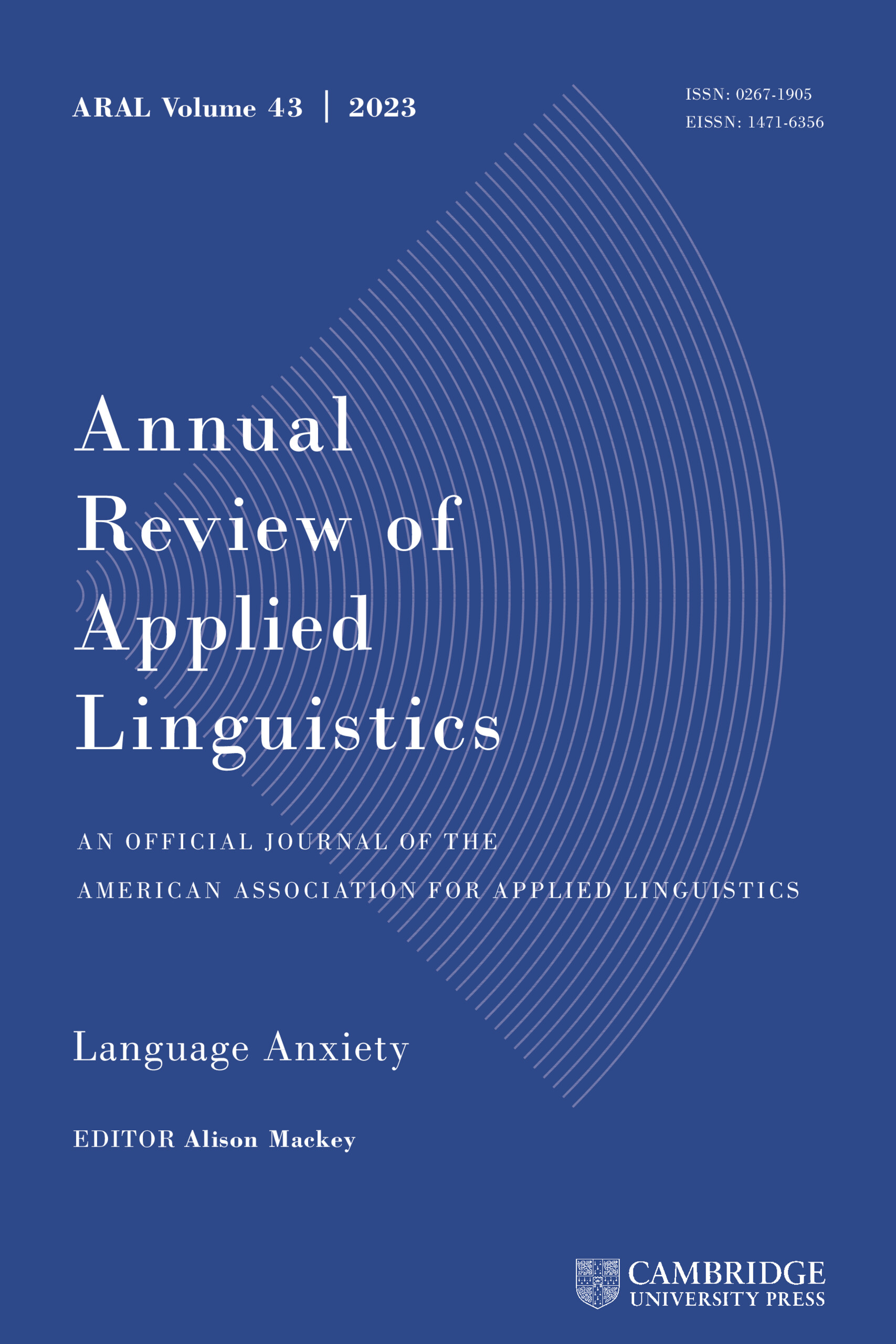Crossref Citations
This article has been cited by the following publications. This list is generated based on data provided by
Crossref.
Kiss, Csilla
and
Nikolov, Marianne
2005.
Developing, Piloting, and Validating an Instrument to Measure Young Learners’ Aptitude.
Language Learning,
Vol. 55,
Issue. 1,
p.
99.
Vandergrift, Larry
Goh, Christine C. M.
Mareschal, Catherine J.
and
Tafaghodtari, Marzieh H.
2006.
The Metacognitive Awareness Listening Questionnaire: Development and Validation.
Language Learning,
Vol. 56,
Issue. 3,
p.
431.
Rao, Zhenhui
2006.
Understanding Chinese Students' Use of Language Learning Strategies from Cultural and Educational Perspectives.
Journal of Multilingual and Multicultural Development,
Vol. 27,
Issue. 6,
p.
491.
Sparks, Richard L.
2006.
Is There a “Disability” for Learning a Foreign Language?.
Journal of Learning Disabilities,
Vol. 39,
Issue. 6,
p.
544.
Sparks, Richard L.
Patton, Jon
Ganschow, Leonore
Humbach, Nancy
and
Javorsky, James
2006.
Native language predictors of foreign language proficiency and foreign language aptitude.
Annals of Dyslexia,
Vol. 56,
Issue. 1,
p.
129.
Dewaele, Jean-Marc
2007.
Predicting Language Learners' Grades in the L1, L2, L3 and L4: The Effect of Some Psychological and Sociocognitive Variables.
International Journal of Multilingualism,
Vol. 4,
Issue. 3,
p.
169.
Roehr, Karen
2008.
Linguistic and metalinguistic categories in second language learning.
Cognitive Linguistics,
Vol. 19,
Issue. 1,
Rysiewicz, Jacek
2008.
Measuring Foreign Language Learning Aptitude. Polish Adaptation of The Modern Language Aptitude Test By Carroll and Sapon.
Poznań Studies in Contemporary Linguistics,
Vol. 44,
Issue. 4,
KORMOS, JUDIT
and
SÁFÁR, ANNA
2008.
Phonological short-term memory, working memory and foreign language performance in intensive language learning.
Bilingualism: Language and Cognition,
Vol. 11,
Issue. 2,
p.
261.
Stansfield, Charles W.
and
Winke, Paula M.
2008.
Encyclopedia of Language and Education.
p.
2226.
SPARKS, RICHARD L.
PATTON, JON
GANSCHOW, LEONORE
and
HUMBACH, NANCY
2009.
Long-term relationships among early first language skills, second language aptitude, second language affect, and later second language proficiency.
Applied Psycholinguistics,
Vol. 30,
Issue. 4,
p.
725.
Csapó, Benő
and
Nikolov, Marianne
2009.
The cognitive contribution to the development of proficiency in a foreign language.
Learning and Individual Differences,
Vol. 19,
Issue. 2,
p.
209.
Roehr, Karen
and
Gánem-Gutiérrez, Gábriela Adela
2009.
The status of metalinguistic knowledge in instructed adult L2 learning.
Language Awareness,
Vol. 18,
Issue. 2,
p.
165.
Hurd, Stella
and
Junhong Xiao
2010.
Anxiety and Affective Control Among Distance Language Learners in China and the UK.
RELC Journal,
Vol. 41,
Issue. 2,
p.
183.
Bain, Sherry K.
McCallum, R. Steve
Bell, Sherry Mee
Cochran, Jeff L.
and
Sawyer, Stephani Choate
2010.
Foreign Language Learning Aptitudes, Attitudes, Attributions, and Achievement of Postsecondary Students Identified as Gifted.
Journal of Advanced Academics,
Vol. 22,
Issue. 1,
p.
130.
Dale, Philip S.
Harlaar, Nicole
and
Plomin, Robert
2012.
Nature and Nurture in School‐Based Second Language Achievement.
Language Learning,
Vol. 62,
Issue. s2,
p.
28.
Rahimi, Mehrak
and
Katal, Maral
2012.
The role of metacognitive listening strategies awareness and podcast-use readiness in using podcasting for learning English as a foreign language.
Computers in Human Behavior,
Vol. 28,
Issue. 4,
p.
1153.
Sparks, Richard L.
Patton, Jon
Ganschow, Leonore
and
Humbach, Nancy
2012.
Relationships among L1 print exposure and early L1 literacy skills, L2 aptitude, and L2 proficiency.
Reading and Writing,
Vol. 25,
Issue. 7,
p.
1599.
Wen, Z.
2012.
Foreign language aptitude.
ELT Journal,
Vol. 66,
Issue. 2,
p.
233.
Rahimi, Mehrak
and
Katal, Maral
2012.
Metacognitive listening strategies awareness in learning English as a foreign language: a comparison between university and high-school students.
Procedia - Social and Behavioral Sciences,
Vol. 31,
Issue. ,
p.
82.


